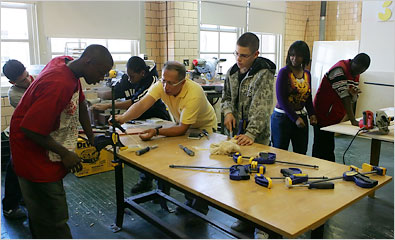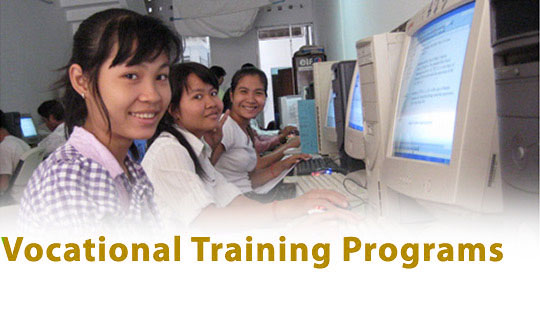Vocational Training In Schools
The Obama Administration today announced that 61 higher education institutions and systems have committed to take the Fair Chance Higher Education Pledge, joining the 25 signatories that took the pledge when it was first announced in June.
- December 6, 2013
Good evening, everyone. Thank you, Doug, for the warm welcome, and for all your hard work and leadership at ACTE. I also want to recognize our UFT colleagues in the room, for your tireless efforts on behalf of students.
- December 6, 2012
As I listened to [IDB] President Moreno's remarks, I was struck not by how different the U.S. education system is but rather by how many educational challenges the U.S. shares with Latin America and Caribbean nations.
- September 26, 2011
Secretary of Labor Hilda L. Solis and Under Secretary of Education Martha Kanter today announced nearly $500 million in grants to community colleges around the country for targeted training and workforce development to help economically dislocated workers who are changing careers.
- April 22, 2011
We're at a time when Americans everywhere are asking some very tough questions about education. But it all comes down to one: What will it take to dramatically improve public education in America?
- October 19, 2010
On Thursday, Brenda Dann-Messier, assistant secretary for Vocational and Adult Education, will deliver opening remarks at the National Career Pathways Network (NCPN) Annual Conference in Dallas, TX.
Vocational and technical programs are shorter, more focused training and educational programs that prepare their students for immediate employment. Although both types of schools are considered trade or career schools, they do vary a bit in their focus. Michigan trade schools and colleges provide many different vocational training programs, all designed to help you gain special expertise. They can help you start a new career or get more opportunities in your current one.
Whether you're still in high school, have recently graduated, want to advance in your current profession, or are considering a career change, vocational schools in Canada offer a variety of educational options that may be suited to your individual interests, goals, and strengths.
Vocational and trade schools provide training in a range of fields that are vital to today's society. From health care to business to beauty to skilled trades—and everything in between—these schools can help you gain career-specific skills and knowledge related to a variety of occupations.
What is Vocational Training?
Vocational training is commonly defined as any training that is specific to a particular occupation. While an academic degree program from a college or university might prepare you to pursue a wide range of entry-level positions within a certain field such as business or IT, vocational training is intended to equip you with the defined competencies (and even certification or licensing) required to pursue a specific position—like hairstylist, construction electrician, or chef.
A vocational school is an institution that provides occupation-specific training, which can lead to an associate degree, diploma, certificate, or another similar credential.
Vocational Training Schools In Texas
Vocational and technical schools in Canada are either public or private institutions that provide career training programs, apprenticeship programs, and much more. These schools can be characterized by the fact that:
- The majority of training options fall into one of four main categories, which include construction, manufacturing, service, and transportation.
- Instructors are typically industry-experienced professionals who possess an understanding of the practical abilities and theories required to enter the specific area that they are teaching.
- Programs are developed with a strong focus on career readiness and generally contain significant hands-on training and opportunities for obtaining real-world experience.
What is the Job Outlook for Vocational Careers in Canada?
Due to an aging baby boomer population, job opportunities are expected to open up across a wide range of skilled occupations in the coming years. According to national projections, about 38 percent of all job openings in Canada between 2017 and 2026 will require at least some college and/or apprenticeship training. This is expected to account for the largest component of new jobs that will be available in Canada.*
Still, when looking at this number, it's important to understand that this isn't an across-the-board representation of jobs. So before pursuing a vocational career, you should look into occupation-specific data for where you live.

Vocational Training In Michigan High Schools
Is a Vocational School the Right Choice for Me?
Before pursuing one of the many available vocational careers, you're likely to want to know if a vocational education is the ideal path for your future.
To help figure out the answer, you may want to:
- Talk to professionals already in the field to learn about wage expectations, local demand, and more.
- Learn about the training you will need to pursue your career goals, and find out if there are local vocational training programs that can provide you with this.
- Obtain a related position in the field. For example, if you want to become a carpenter, you could seek a job as a carpenter's helper. Or, if you want to work toward a career as a chef, you could try to land a position as a dishwasher or prep cook in a commercial kitchen.
- If you're still in high school, you could complete a youth apprenticeship program, which can help you gain valuable skills and provide a glimpse of your potential career future.
What are the Benefits of Attending a Vocational School?

Adult Vocational Training Program
- Career-focused education—Unlike traditional college or university programs, a vocational or technical school program can provide training that is concentrated solely on developing occupation-specific skills and knowledge. Some programs can even prepare you to obtain Red Seal certification, journeyperson certification, or licensing related to a particular profession.
- Cost-effective training—Since vocational programs tend to cut out the need for general education courses, you can enjoy a more condensed education, which can result in lower costs and less of a time commitment.
- Regularly updated curricula—Vocational training programs are generally developed with direct input from industry employers in order to produce graduates who possess the skills and knowledge needed to meet actual job demands. Because of this, many vocational schools frequently review and refine their curricula.
- Job-ready programs—By choosing a vocational education over the traditional academic route, you could obtain training that is specifically intended to help you graduate ready to move directly from the classroom into the workforce.
- Available funding—Especially in Canada, a number of government grants and other incentives are offered to those who pursue vocational careers.
High School Vocational Training Programs
Where Do I Go From Here?
Vocational Training Schools In Florida
Now that you are armed with answers to some of the top questions about obtaining a vocational education, you may be ready to take the next step in your journey. Begin by finding Canadian vocational schools and programs that are a match for you today!